Crafting effective pre k lesson plans is a fundamental part of educating our youngest learners. The ultimate guide will discuss the purpose of preschool lesson plans, provide practical tips on how to write them, and share some of the best lesson plans available for your needs. We’ll also explore methods for assessing students to inform future lesson planning.
When working with these little ones, it’s crucial to have an array of lesson plans at your disposal to foster their holistic development and growth.
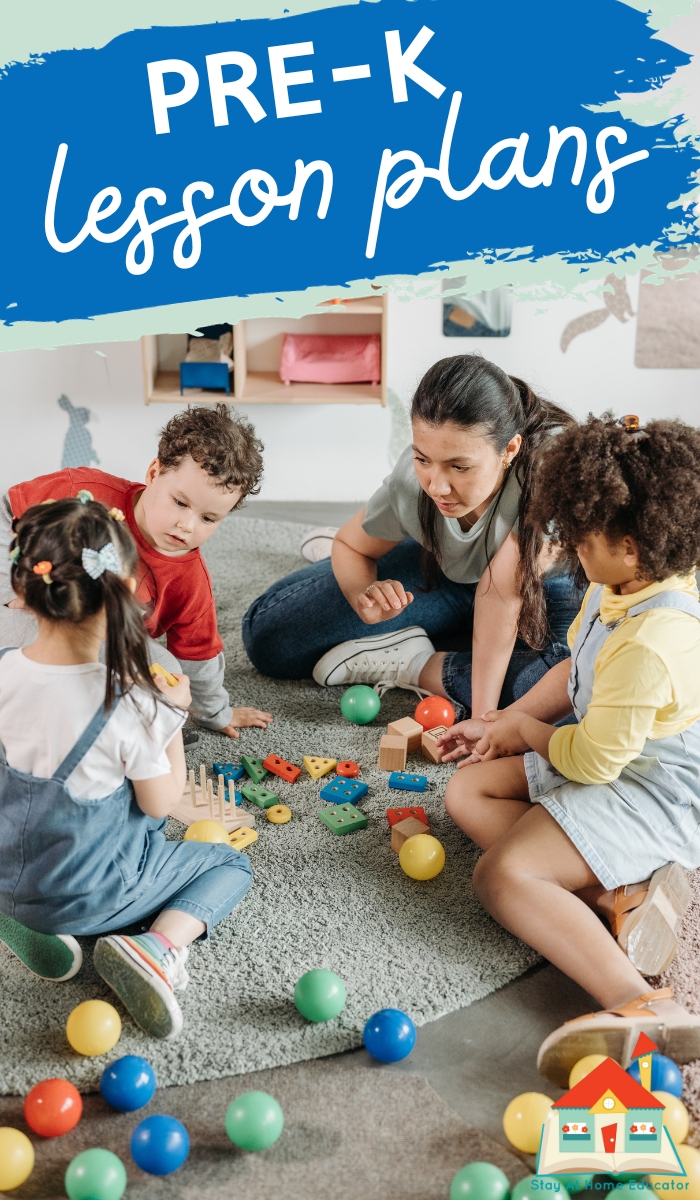
This post may contain affiliate links, which means that at no cost to you, I may earn a small sum if you click through and make a purchase.
Teaching requires thorough planning, particularly when creating daily engaging content and activities for young children. It’s essential to have a variety of lesson plans on hand to support their overall growth and development.
Preschool lesson plans equip teachers to instill the crucial skills children need for kindergarten and future learning. These plans allow teachers to structure different teaching strategies and learning objectives, as well as connect activities and themes.
Lesson planning also allows teachers to evaluate their methods, identify any hurdles, and devise solutions. Post-lesson assessments help teachers understand children’s capabilities, strong points, and areas that need improvement.
-
Product on sale
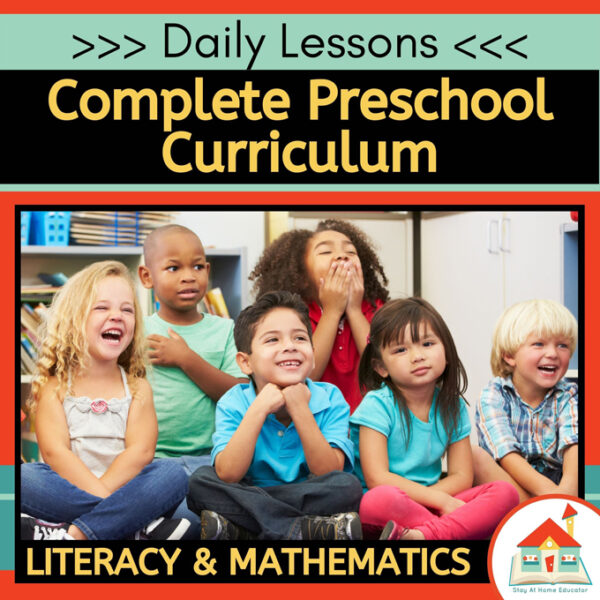 * Daily Lessons in Preschool Literacy & Math CurriculumOriginal price was: $270.00.$121.50Current price is: $121.50.
* Daily Lessons in Preschool Literacy & Math CurriculumOriginal price was: $270.00.$121.50Current price is: $121.50.
Preschool Lesson Plans with Goals and Objectives
Preschool plays a pivotal role in a child’s growth and development. This phase is when children start exploring their own identities while also acquiring knowledge necessary for kindergarten and subsequent academic stages.
As an educator, your role involves guiding them through early childhood and equipping them for what lies ahead. This is why well-planned preschool lessons with specific, developmentally appropriate learning objectives are so important.
Pre K Math Lesson Plans
The groundwork for mathematics is laid during preschool.
In this stage, children typically learn fundamental math concepts such as rote counting (counting up to 10), rational counting (counting objects and assigning value), along with classifying and sorting items based on length, weight, size, and shape.
These skills provide a robust foundation for children to grasp more advanced math skills like addition and subtraction in the future.
Preschool Math Skills Checklist
Not sure exactly which math skills preschoolers should be learning? Fill out the form below and a checklist will be sent to your inbox. This checklist goes into detail about exactly which preschool math skills should be mastered before kindergarten.
Pre K Math Curriculum
Our Daily Lessons in Preschool Mathematics Curriculum is a fun-filled alternative to tedious worksheets, covering all five math disciplines. It provides daily math activities that include learning new skills, review exercises, literacy integration, and independent practice.
This product is an all-in-one bundle of nine preschool math units, providing everything you need for a year of preschool math instruction!
Unlike other preschool math curriculum, our curriculum is comprehensive and spirals. It uses proven teaching methods and guides you on what, when, and how to teach each math skill most effectively.
-
Product on sale
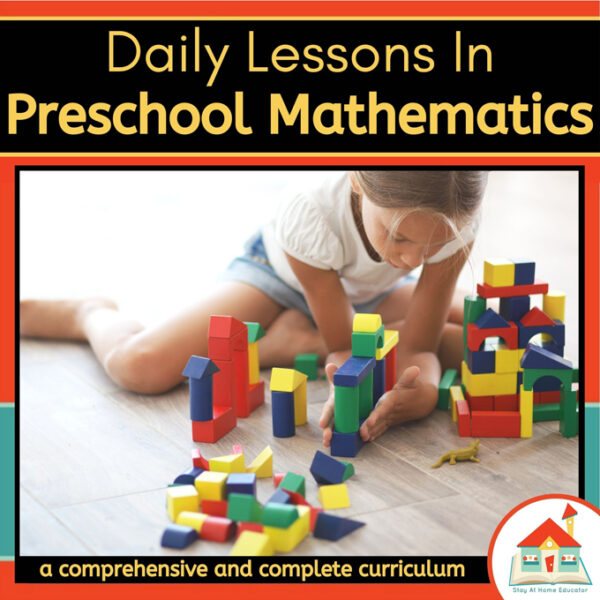 *** Daily Lessons in Preschool Mathematics CurriculumOriginal price was: $135.00.$99.00Current price is: $99.00.
*** Daily Lessons in Preschool Mathematics CurriculumOriginal price was: $135.00.$99.00Current price is: $99.00.
Pre K Literacy Lesson Plans
The foundation for literacy is established during the preschool years.
During this phase, children usually acquire fundamental literacy skills such as letter recognition , phonological awareness, and basic print concepts. Preschoolers also begin to grasp story comprehension (recognizing the beginning, middle, and end of a story) and start classifying and sorting words into categories, building their oral language skills and vocabulary development.
These skills build a solid groundwork for children to understand more advanced literacy skills like reading and writing sentences in the future.
Preschool Literacy Skills Checklist
Unsure about the specific literacy skills your preschooler should be acquiring? Request for our detailed checklist to be sent directly to your inbox.
This comprehensive list delves into the precise literacy abilities that preschoolers should ideally master before they transition to kindergarten.
Pre K Literacy Curriculum
Looking to take the uncertainty out of teaching preschool literacy?
Our year-long preschool lesson plans, designed with a systematic sequence for skill progression, are just what you need. Each lesson builds on the previous one, ensuring your students feel successful and confident each day. It is the most effective preschool literacy curriculum I can recommend.
It’s like having a roadmap to literacy that guides you every step of the way. It includes simple print and teach lesson plans, as well as whole group and small group play based activities that prepare children for learning how to read.
-
Product on sale
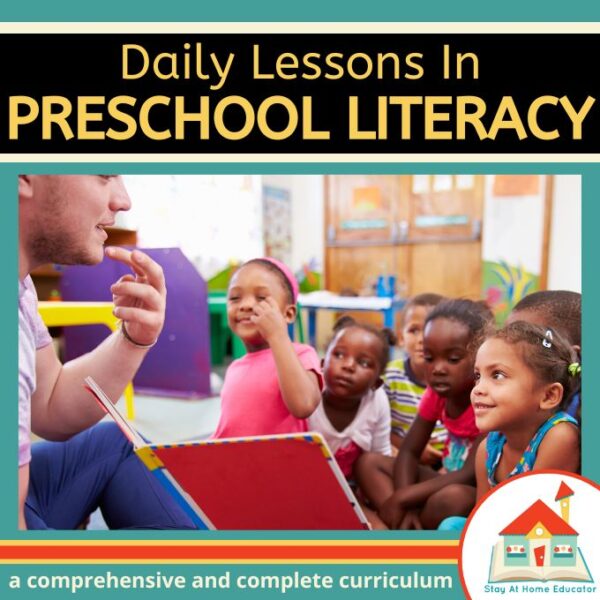 * Daily Lessons in Preschool Literacy CurriculumOriginal price was: $135.00.$99.00Current price is: $99.00.
* Daily Lessons in Preschool Literacy CurriculumOriginal price was: $135.00.$99.00Current price is: $99.00.
What is the Difference Between Curriculum and Lesson Plans?
Curriculum and lesson plans are both vital components in the educational process, but they serve different purposes and operate at different scales.
Curriculum Definition
This is a broad term that refers to the overall educational content and structure provided by a school or educational institution. It outlines the learning objectives, themes, and topics to be covered in each subject over a specific period (usually an academic year).
A curriculum generally includes the goals of a course, the methods of instruction, the learning outcomes, and the means of assessment. It provides a comprehensive framework that guides the teaching and learning process.
Lesson Plans Definition
A lesson plan breaks down the curriculum into manageable units for daily or weekly instruction. It outlines specific activities, resources, materials, and assessments that will be used to teach a particular topic or skill.
Lesson plans often include a set of objectives for the lesson, a detailed procedure, and a plan for assessing student understanding.In simple terms, you can think of the curriculum as the “what” – what students need to learn over the course of a school year, and the lesson plan as the “how” – how teachers will teach this material on a day-to-day basis.
We go even more in depth in this article: Curriculum vs. Lesson Plans.
How to Write Lesson Plans for Preschool
Preschool lesson plans are vital tools for teachers, enhancing organization, promoting high-quality instruction, and aiding in evaluating learning outcomes. Here’s a simplified guide on how to create them:
- Set Your Learning Objective
- Identify what you want the children to learn after the lesson. This could be specific goals or areas in your curriculum like social-emotional or cognitive skills.
- Select Lesson Materials
- Determine what materials you need for the lesson. Make sure they’re safe, age-appropriate, and easily accessible.
- Outline Your Lesson Procedures
- Break down your lesson into sections like introduction, main activity, group work, and independent practice.
- Assessment
- Evaluate if you’ve achieved your desired outcomes at the end of the lesson by observing the children’s progress and asking questions to identify any learning challenges or confusion.
- Reflection
- Reflect on the lesson, noting what worked well and areas for improvement. This self-evaluation will help with future planning and adjustments to your materials or procedures.
- Reflect on the lesson, noting what worked well and areas for improvement. This self-evaluation will help with future planning and adjustments to your materials or procedures.
You can read this incredibly in-depth series about how to write preschool lesson plans for the entire year.
Pre K Homeschool Lesson plans
Looking for a homeschool preschool curriculum that covers all the most important skills? You’ll need lesson plans that are designed to be engaging and informative, facilitating a comprehensive educational experience for children.
Here are some articles to get you started.
- Must Have’s in a Homeschool Preschool Curriculum
- Pre K Homeschool Curriculum
- 5 Tips for Learning at Home
- Best Play Based Learning Curriculum
Preschool Assessments and Portfolios
Preschool assessments are a crucial element in the development of effective Pre-K lesson plans. They serve as a valuable tool for understanding each child’s unique abilities, learning styles, and areas that might require extra attention.
With this information, educators can customize their lesson plans to cater to the specific needs of each student, ensuring that all learning objectives are met.
Additionally, regular assessments allow teachers to monitor progress, identify potential learning barriers early on, and make necessary adjustments to the curriculum.
By using assessment data to guide lesson planning, teachers can provide a more personalized, engaging, and impactful learning experience, which is pivotal for the young learners’ educational growth and success.
-
Product on sale
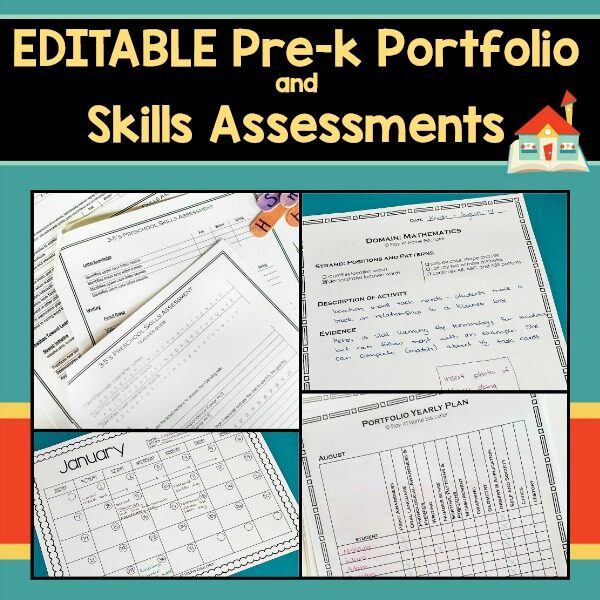 EDITABLE! Preschool and Toddler Portfolio and Skills AssessmentsOriginal price was: $12.00.$6.00Current price is: $6.00.
EDITABLE! Preschool and Toddler Portfolio and Skills AssessmentsOriginal price was: $12.00.$6.00Current price is: $6.00.
How to Make Lesson Plans for Preschool
Crafting editable lesson plans necessitates substantial planning and innovation. An effective lesson plan should integrate crucial components such as educational goals, pertinent resources, age-suitable activities, and evaluation techniques.
Tips and Tricks
What are your best tips for lesson planning? Leave you ideas in the comments!

I’m Sarah, an educator turned stay-at-home-mama of five! I’m the owner and creator of Stay At Home Educator, a website about intentional teaching and purposeful learning in the early childhood years. I’ve taught a range of levels, from preschool to college and a little bit of everything in between. Right now my focus is teaching my children and running a preschool from my home. Credentials include: Bachelors in Art, Masters in Curriculum and Instruction.
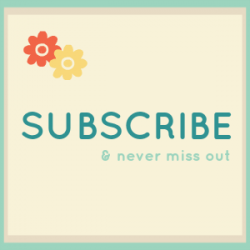
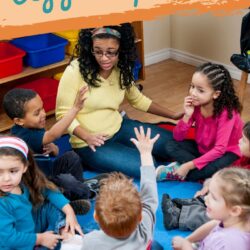

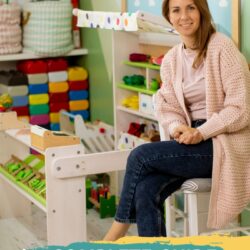

Leave a Reply